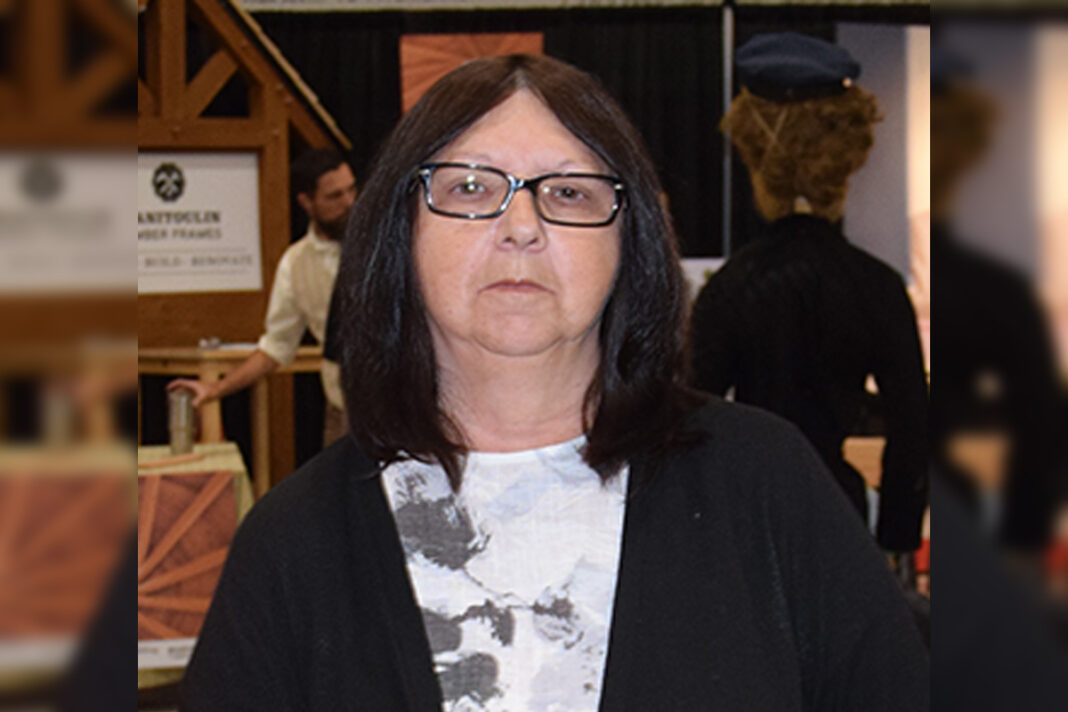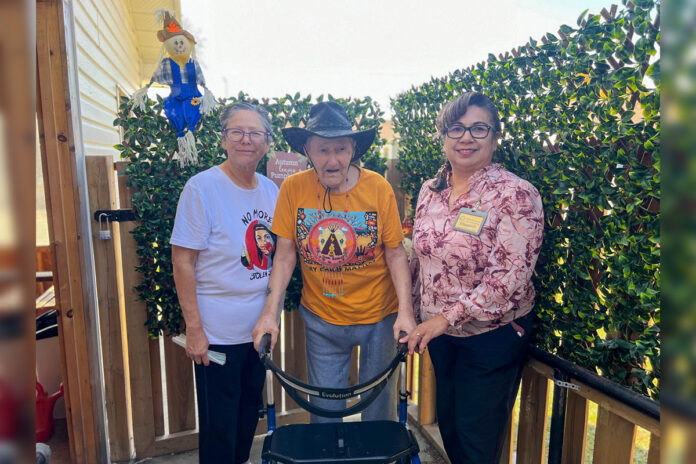CALGARY—While the leader of the Chiefs of Ontario (COO) says he will continue to fight for on-reserve children facing systemic discrimination through First Nations Child and Family Service Program, a Manitoulin Island First Nation chief expressed her dismay and disappointment in the vote taken by chiefs and proxies from across Canada against a resolution supporting the $47.8 billion final agreement aimed at reforming the program funding at last week’s Assembly of First Nations Special Chiefs Assembly. One-hundred and forty-seven chiefs were in favour of the agreement, with 267 chiefs opposed and one abstained. The vote on the agreement came after a nearly two-decade battle to end discrimination against on-reserve children involved with the child welfare system and those who were removed from their families and nations.
“I don’t feel good about it today,” stated Patsy Corbiere, chief of Aundeck Omni Kaning First Nation. “We have been trying to get recognition for Truth and Reconciliation and should have moved forward on this. It would have helped our children and communities in so many ways.”
“I am not happy with it,” said Chief Corbiere. “It’s like climbing to the top and then having someone knock you off the ladder. We have been at this issue for a long time, and a lot of time, energy and legal fees had gone into this. Now there is nowhere to go on this issue.”
“As we have been saying throughout this entire process, it was ultimately up to leadership to accept or reject this agreement,” said Ontario Regional Chief Abram Benedict in a release. “They’ve made their voices heard today. While we’re disappointed in today’s outcome, we will continue to fight for the children on-reserve who are not getting fair and adequate care. We’re going to take a breath and consider our options of how we’ll move forward. The COO has a mandate to stop the discrimination against on-reserve children and we will fulfill it.”
Both the COO and Nishnawbe Aski Nation passed resolutions earlier this month supporting the final agreement during special chiefs’ assemblies.
Chippewas of the Thames First Nation Chief Joe Miskokomon, who seconded the resolution supporting the agreement, urged national unity and solidarity among First Nations across Turtle Island. “We’ve heard about the hurts; we’ve heard about going forward. But what happens if we don’t go forward today? What happens is we’re stuck in the status quo. The resources will not get to our communities; the poverty will not magically go away. The addictions will continue to happen. The abuses will continue to happen. And the children will be ones to bear the scars,” he said during his speech introducing the resolution.
“Our children are our future, and we will not give up on them,” said Regional Chief Benedict. “We will work with the Ontario leadership, our legal counsel and experts in the field to determine the best path forward, and we expect this to spur an invigorating discussion at our November fall Chiefs Assembly in Thunder Bay.”
After the first two days of hearing varying perspectives on the proposed deal, the AFN chiefs had a lengthy debate on the resolution titled ‘Our Children, Our Future-Draft Agreement’ on reforming the First Nations Child and Family Services Program.”
CBC reported that Khelsilem, spokesperson for the Squamish Nation in B.C. was among many leaders to speak against the resolution. “I’m here to ask the chiefs and proxies who are undecided, who are unsure, to vote down this resolution. No amendments to this resolution will clean up the fact that the first line in the resolution calls for the approval of the amendment to the FSA. “We need to say no to this version of the FSA. The reason why is because there are so many flaws with the FSA we’ve heard that over the last few days.”
CBC reported that National Chief Cindy Woodhouse Nepinak told the chiefs in attendance, “This is your agreement to consider, and I will take whatever direction you give me. But I do say, let’s try and come together and find a common way through this because it’s too much money to just wipe off the table and leave to the courts.”
The chiefs heard from the representative plaintiffs in the class action on the impacts of the discrimination on child and family services. “There’s a choice that you guys have to make today and I hope that you take into consideration the representative plaintiffs stories and our lived experience and put this to an end because each one of us are going through our struggles every day,” said Melissa Walterson, one of the six representative plaintiffs in the class action.
CBC reported that Ashley Bach, another plaintiff, said she hoped the agreement would be approved. “Despite those colonial systems working against us, a once in a lifetime agreement has been reached. This agreement is a once-in-a-lifetime childhood agreement because if we take too long, we’re going to lose another generation. If we wait years and years for a perfect settlement agreement, they won’t be kids anymore and they’ll be like me.”
CBC reported that the assembly heard from a panel of experts working in child welfare. Richard Gray social services manager with First Nations of Quebec and Labrador Health and Social Services Commission, said Quebec First Nations would not be supporting the settlement agreement for many reasons. He was quoted as saying, “I heard leadership say they are the ones on the front lines taking care of their communities, but I think moving forward chiefs have to have a voice in the final agreement and it’s not this version.”
Cindy Blackstock, executive director of the First Nations Child and Family Caring Society, (which had initiated the complaint to the human rights tribunal along with AFN in2007) said the society didn’t sign the agreement. “We want to acknowledge that there are some strengths in the agreement, but we also feel like there are structural weaknesses. We have been at this human rights case for 18 years. Are we going to agree to a deal that’s nine years and keep our fingers crossed after that?”
“This was a historic opportunity for our First Nation children,” Chief Corbiere said. “That $47.8 billion settlement is a lot of money. It would have been incredible what we could have done for our children with this.”
“There are drug and child welfare issues in all our communities, non-First Nation as well as First Nations and we need more staff, help and support for children. But the chiefs reject the agreement because of typos in the agreement? Who are we hurting? Families and children that need help. This is a child/youth issue, and that is who we should be voting on behalf of, not the chiefs.”
Chief Corbiere said, “When you have families and individuals crying on the stage (at the assembly) and heard what they are going through, what does it do to them when the chiefs vote down the agreement?”
Chief Corbiere had sent a template for the AOK delegate to voice at the meeting. It states in part, “As the chief of Aundeck Omni Kaning I have seen firsthand the impact that underfunding and an inadequate support system have had on our community. Our children and families have been the recipients of a discriminatory system that increased the risk of children being separated from their families and culture.”
“The draft agreement on reforms to the First Nations Child and Family Services program promises to address long-standing funding gaps by providing substantial, direct funding to First Nations, allowing us to develop and implement the kind of services that prioritizes the community’s vision of well-being and sees agencies working with the community to keep families together,” said Chief Corbiere. “The draft agreement is critical for the well-being of our children, families and nations. I urge members in their First Nations to voice their support for the draft agreement to their chiefs. This is a chance to correct long-standing injustices and invest in our future generations. The time to act is now. Missing this opportunity would mean missing out on the potential to create lasting, positive change for our families and children. Let us take this moment to make a real difference in the lives of our people. Our children are counting on us.”
The funding term for the final agreement was for a total of 10 years that was set to start on April 1, 2024, ending in March 2034. The funding approach after the 10-year term would have been evaluated by an independent programs assessment of the effectiveness of the program. Orders handed down from the Canadian Human Rights Tribunal state that Canada must provide non-discriminatory funding for services to First Nations children on-reserve.
After the vote was taken the First Nation chiefs voted in favour of a new negotiation process to reform the child welfare system after the $47.8 billion deal with Canada had been defeated.
The new process will see the creation of a children’s chiefs’ commission made up of leadership from all regions of the country, and for a new negotiation and leadership team.
The rejected deal had been struck between the federal government, the Chiefs of Ontario, Nishnawbe Aski Nation and the Assembly of First Nations after a newly two-decade legal battle over the federal government’s underfunding of on-reserve child welfare services.
The Canadian Human Rights Tribunal has said that was discriminatory, reported the Canadian Press. It tasked the federal government with reaching an agreement with First Nations to reform the system and also with compensating children who were taken from their families and put in foster care.





